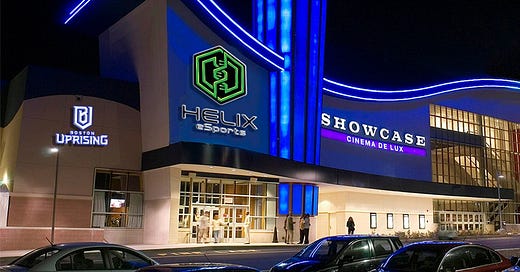Esports Entertainment Group to sell esports assets, “aggressively” cut costs
Sharpr is a weekly newsletter covering the intersection of esports and betting
Hey everyone, and happy Thursday.
The esports betting sector was rife with activity this week, headlined by Esports Entertainment Group’s substantial course correction, which would see the company plan to sell its Helix gaming centers, and possibly more of it esports assets.
Let’s jump right in.
In this week’s edition of Sharpr…
Esports Entertainment Group to sell esports assets, “aggressively” cut costs.
Twitch petition calls on brands to help bar gambling content from the platform.
Esports Awards to take place in Las Vegas.
If this newsletter was forwarded to you, please consider subscribing.
Esports Entertainment Group to sell esports assets, “aggressively” cut costs
Esports Entertainment Group published its quarterly earnings report on Monday, highlighting considerable monetization difficulties with its esports assets, which it now intends to divest to grow its bottom line.
EEG will take a $38.6M USD impairment charge in the quarter across its Helix eSports, ggCircuit, and Esports Gaming League (EGL) assets.
The company is working to divest Helix eSports, a LAN gaming center company EEG acquired in June 2021 (alongside ggCircuit) for a reported $43M.
CEO Grant Johnson says the company will “dramatically simplify” its offering in esports and take on an “asset-light model,” focusing on SaaS technology, in-person tournaments, and its peer-to-peer wagering platform.
EEG will “aggressively” cut costs across its brands and deprioritize non-core assets in an effort to record savings over the next 12 months as a result.
Revenue from the quarter amounted to $15.7M, up $5.4M from the corresponding period a year ago, and 8.3% from the previous quarter. The company pinned its revenue growth to previous M&A activity, including the acquisition of B2C casino and sportsbook operators Argyll Entertainment, Lucky Dino, and Bethard.
Still, operating expenses were high, totaling $66.3M (including its $38.6M impairment charge) with a loss of $50.6M, an 803% increase from the previous year, with spending climbing in all areas.
Despite a material increase in performance, the company’s shift in strategy has seen EEG update its revenue forecast for the year, which is expected to reach between $55-$60M, down from the initial range of $70-$75M.
“While we have come a long way in a short period of time, there is much work ahead of us as we become a leaner organization that can operate more efficiently and create greater value for our partners and shareholders,” Johnson said in a release, adding that he expects the result of these efforts to achieve breakeven cash flows on an annual basis by FY2023.
As Roth Capital analyst Edward Engel described the situation, EEG has transitioned into survival mode, limiting the company’s growth in the near-term as it seeks to rebuild its cash balance.
🦈 Sharpr Take: The financial report and commentary provides a good picture of the much-needed restructuring EEG will undergo to reach profitability, although there remains some open ended questions.
Of the company’s renewed priorities across tournaments, technology, and peer-to-peer wagering, its esports betting brand VIE.gg is noticeably absent.
In January, EEG launched its esports betting platform in New Jersey after receiving state regulatory approval.
EEG leverages a commercial relationship and casino license with Bally’s Atlantic City Hotel & Casino to operate its online sportsbook.
At the time of its NJ launch, Johnson estimated the platform would generate $1-2M in annual revenue. That forecast has so far proven to be dramatically overvalued. Last month, VIE.gg took in just $23 in gross revenue according to Bally’s tax return for April.
With the platform severely underperforming and just a brief cameo in EEG’s earnings commentary, it begs the question whether esports bookmaking will remain a path forward and priority for the company in the future, especially in light of its “asset-light” approach to esports holdings.
Separately, while peer-to-peer wagering is referenced several times in the release, LANDuel is never explicitly mentioned.
LANDuel was initially acquired as part of its Helix deal, and the company hung its hat on the skill-based betting tech as an innovative way to engage with esports consumers.
In March, EEG hosted a skill-based Madden NFL event at the Hard Rock in Atlantic City, attracting a few dozen players onto casino grounds.
While it seems that the company had just started to ramp up activations around LANDuel, its sabbatical from the release is peculiar. Adding to our skepticism is its now-deactivated Twitter handle. A source claims LANDuel is being sold alongside Helix to offset debt.
UPDATE: MAY 26, 12:19PM: A company representative has reached out to clarify LANDuel will not be sold and instead the platform is in the process of a rebranding — a source claims FanDuel had sent EEG a cease-and-desist letter regarding the likeness in name.
Twitch petition calls on brands to help bar gambling content from the platform

A petition posted on May 20 urging Twitch to ban casino gambling content from the live-streaming platform is gaining traction from users and brands.
The petition seeks to put an end to “unregulated online casinos that disproportionately damage young viewers and racial minorities.”
McDonald’s, Uber, and Pepsi are all said to have signed off on the idea.
Approximately 21% of Twitch users are between 13 and 17-years-old.
The petition is the latest development in an incredibly controversial and drawn-out scenario between influential Twitch streamers and online casino brands.
Several of Twitch’s top creators have spoken out this week against the rampant amount of gambling content on the platform. One of those voices was Imane "Pokimane" Anys, who suggested that crypto casinos promoted by other top streamers are “legally ambiguous and morally corrupt” – and she’s not far off.
High-performing Twitch streamers are paid millions to broadcast themselves gambling to hundreds of thousands of viewers, often containing a percentage of underage audiences.
Curaçao-licensed crypto casinos such as DuelBits and Stake are two companies consistently found engaging with top streamers in promotional capacities.
Streamers are provided with referral codes that offer a kickback on users’ losses–Félix “xQc” Lengyel claimed $119M has been wagered through his promotional link.
Twitch’s terms of service currently permits gambling content, and even has a dedicated category for slots on its platform (which boasts 1M followers). It’s unclear whether or not this latest wave of contention will be enough to push Amazon’s live-streaming juggernaut in one direction or the other.
The company will likely need to consider options at some point, however given the very illegal nature of promoting gambling content to minors, and the fact that it's playing a heavy hand in facilitating that, whether it wants to believe it or not..
At the time of writing, the petition has been signed by more than 1,400 individuals.
🗞 In the news
The 2022 Esports Awards will take place at the Resorts World Theater in Las Vegas after years of being hosted at Esports Stadium Arlington.
Overwatch League says its Pick’em feature is unlocking “additional engagement” across its fan base.
GRID Esports has promoted Mikael Westerling to chief sales officer.
EPIC Risk Management has called on UK authorities to ban the sale of loot boxes to consumers under the age of 18.
📈 By the numbers
Approximately 15% of Australians are interested in betting on esports, compared to Canada (10%) and the U.S. (10%), according to research from YouGov.
Rivalry betting handle reached a record high of $40.2M, the company revealed in a recent earnings report.
FanDuel topped New York online sports betting with 42% of handle and 57% of revenue among all eight operators.





